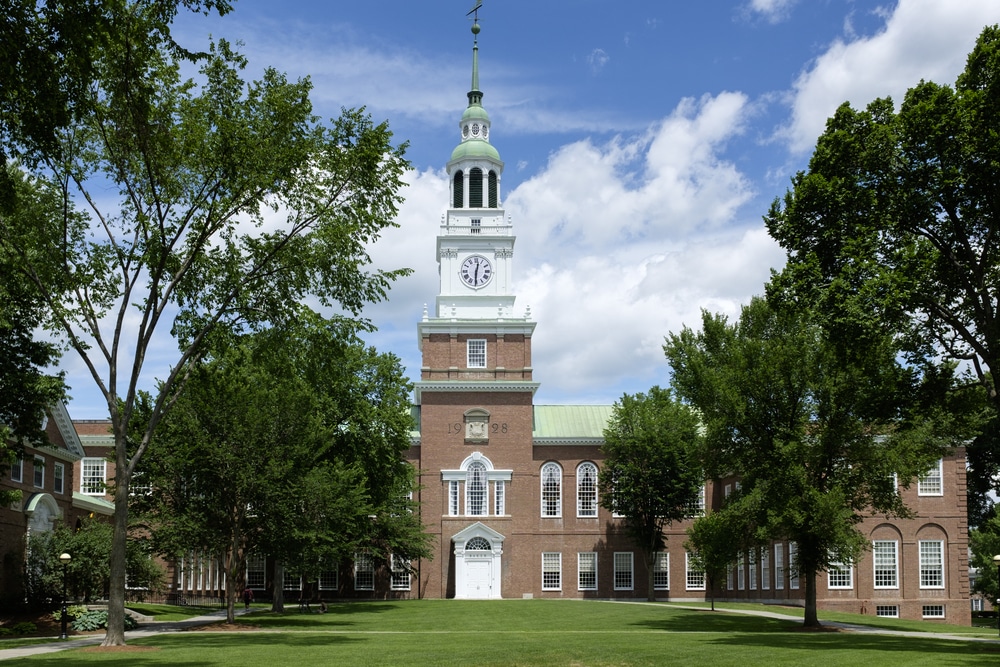Dartmouth’s Regular Decision Process
Applying to college is a significant milestone in a student’s life, filled with anticipation, preparation, and uncertainty. Dartmouth College, a prestigious Ivy League institution, is one destination that attracts numerous students globally every year. Understanding the details of their Regular Decision process can help applicants feel more confident and improve their chances of success.
The Basics of Dartmouth’s Regular Decision Process
Dartmouth’s Regular Decision process allows students the chance to apply to the college without being bound by the obligation of early decision plans. Unlike Early Decision, where students commit to their choice upfront, Regular Decision lets them hold off on making their final decision until they have heard back from all colleges to which they applied.
Compared to Early Decision, the Regular Decision process is typically less competitive, as students have extra time to submit their best applications. However, it is equally rigorous and serious, as Dartmouth looks for students who embody their mission of lifelong learning and leadership.
When applying through Regular Decision, students have the opportunity to carefully consider their options and compare different colleges before making a final decision. This flexibility allows them to explore various academic programs, campus cultures, and extracurricular opportunities.
Furthermore, Regular Decision applicants have the advantage of being able to showcase their academic growth and achievements throughout their high school years. They can include their latest grades, honors, and extracurricular involvements, providing a comprehensive picture of their abilities and potential.
Key Dates and Deadlines
The Regular Decision application deadline at Dartmouth generally falls in the first week of January each year. Students are notified of their application results in late March. The national candidate’s reply date, by which students must accept or decline their offers, is May 1st.
However, these dates can vary slightly from year to year, so it’s essential to check Dartmouth’s admissions website for the most accurate information. Dartmouth understands the importance of clear communication and strives to provide applicants with timely updates regarding the application process.
During the period between submitting their application and receiving a decision, students may experience a mix of anticipation, excitement, and nervousness. It is a time for reflection as they consider their academic and personal goals and envision themselves as part of the Dartmouth community.
Required Documents for Application
In order to apply for Dartmouth’s Regular Decision, students need to submit several documents. These include the Common Application or Coalition Application, a high school transcript, standardized test scores, two teacher evaluations, a mid-year school report, and a counselor recommendation.
The Common Application or Coalition Application serves as a comprehensive platform for students to provide information about their academic background, extracurricular activities, and personal experiences. It allows them to showcase their unique qualities and aspirations, helping the admissions committee gain a holistic understanding of their potential as Dartmouth students.
Standardized test scores, such as the SAT or ACT, provide additional insights into a student’s academic abilities. While Dartmouth values these scores, they also consider the whole applicant, recognizing that academic potential cannot be solely determined by a single test.
Teacher evaluations play a crucial role in the application process, as they provide valuable insights into a student’s intellectual curiosity, work ethic, and character. These evaluations allow teachers to highlight the student’s strengths and potential for growth, giving the admissions committee a more comprehensive perspective.
The mid-year school report and counselor recommendation provide additional context and support for the student’s application. They offer a comprehensive overview of the student’s academic performance, personal growth, and contributions to their school community.
Furthermore, Dartmouth may require supplementary essays and interviews as part of the Regular Decision application process. These additional requirements offer students the opportunity to delve deeper into their interests, experiences, and aspirations. They allow applicants to showcase their writing skills, critical thinking abilities, and passion for learning.
Overall, the Regular Decision process at Dartmouth provides students with a fair and thorough evaluation of their qualifications and potential. It allows them to present a comprehensive picture of their academic achievements, personal growth, and aspirations, ensuring that Dartmouth can select a diverse and talented incoming class.
The Role of the Admissions Committee
The Admissions Committee at Dartmouth plays a pivotal role in the Regular Decision process. The members of the committee are responsible for evaluating each application in a comprehensive and holistic manner.
Their objective is to select students whose academic prowess, extracurricular involvement, and personal characteristics align with Dartmouth’s mission and values.
The Admissions Committee takes their role seriously, recognizing the importance of shaping the incoming class and creating a diverse and vibrant community on campus. They understand that the admissions process is not just about selecting the best students academically but also about finding individuals who will contribute to the Dartmouth community in meaningful ways.
As part of their evaluation process, the committee considers not only the applicants’ academic achievements but also their personal qualities and potential contributions to the Dartmouth community. They understand that a well-rounded student body is crucial for fostering a rich and dynamic learning environment.
Evaluation Criteria
The Admissions Committee evaluates applicants on their academic achievements, personal qualities, and potential contributions to the Dartmouth community.
The primary considerations include academic performance in high school, standardized test scores, personal essays, letters of recommendation, extracurricular activities, and interviews.
Academic performance in high school is a key factor in the evaluation process. The committee looks for students who have challenged themselves academically and have demonstrated a strong work ethic and intellectual curiosity. They consider factors such as GPA, class rank, and the rigor of the courses taken.
Standardized test scores, such as the SAT or ACT, provide additional insight into an applicant’s academic abilities. While these scores are not the sole determinant of admission, they do provide a standardized measure that can be compared across applicants.
Personal essays offer applicants the opportunity to showcase their unique experiences, perspectives, and aspirations. The committee looks for essays that are well-written, thoughtful, and reveal something meaningful about the applicant’s character and values.
Letters of recommendation provide valuable insights into an applicant’s personal qualities and potential for success at Dartmouth. The committee pays close attention to the perspectives of teachers, counselors, and other individuals who can speak to the applicant’s academic abilities, character, and potential for growth.
Extracurricular activities play a significant role in the evaluation process. The committee values students who have shown dedication, leadership, and a genuine passion for their pursuits outside of the classroom. They understand that involvement in extracurricular activities can foster important skills such as teamwork, time management, and resilience.
Interviews, while not required, offer applicants the opportunity to further highlight their personal qualities and demonstrate their interest in Dartmouth. The committee considers the interview as an additional piece of the puzzle, providing a more personal and nuanced perspective on the applicant.
The Decision-Making Process
The decision-making process involves a thorough and fair consideration of each application. It typically involves multiple rounds of review, with a subset of the committee discussing the merits of each applicant before reaching a consensus.
The diversity of perspectives in the committee ensures that every applicant receives fair and comprehensive consideration. Committee members bring their unique backgrounds, expertise, and experiences to the table, contributing to a well-rounded evaluation process.
During the review process, committee members engage in thoughtful discussions, weighing the strengths and weaknesses of each applicant. They consider how each applicant aligns with Dartmouth’s mission and values, as well as how they will contribute to the campus community.
The decision-making process is not taken lightly. The committee understands the impact of their decisions on the lives of the applicants and the Dartmouth community as a whole. They strive to make informed and thoughtful choices, recognizing that each admitted student will bring their own perspectives, talents, and aspirations to campus.
Ultimately, the Admissions Committee’s goal is to create a diverse and talented incoming class that will thrive academically, contribute to the Dartmouth community, and make a positive impact on the world beyond graduation.
After Submitting Your Application
Once you’ve submitted your application, it’s natural to feel both relief and anxiety about what comes next. Here’s what you can expect during the waiting period.
After you submit your application, the Admissions Committee begins its review process. They carefully evaluate each component of your application, including your academic achievements, extracurricular activities, personal statement, and letters of recommendation. This thorough review ensures that they have a comprehensive understanding of your qualifications and potential as a student.
During this time, it’s important to continue excelling in your current courses and stay engaged in your extracurricular activities. While the waiting period can be nerve-wracking, it’s crucial to maintain your focus and dedication to your academic and personal pursuits. Remember, your commitment to growth and learning extends beyond the application process.
Remember, if you’re waitlisted or deferred, you’ll need to provide an updated mid-year grade report, which can affect your final decision. This report allows the Admissions Committee to assess your continued academic progress and determine if any changes have occurred since you submitted your application. It’s essential to maintain your academic performance throughout the year, as it can significantly impact your chances of being accepted.
Understanding the Admissions Notification
Admissions decisions are usually either acceptances, rejections, or waitlist invitations. An acceptance letter is the most desired outcome, as it means you have been offered a place in the incoming class. Receiving an acceptance letter is a moment of celebration and accomplishment, as it signifies that your hard work and achievements have been recognized.
On the other hand, a rejection letter can be disappointing. It’s important to remember that a rejection does not define your worth or potential. Many highly successful individuals have faced rejection at some point in their lives. Use this experience as an opportunity for growth and self-reflection, and remember that there are always alternative paths to achieving your goals.
Sometimes, an application can also be deferred, especially if the admissions committee requires more information to make a decision. Being deferred means that the committee needs additional time to evaluate your application. It’s not a rejection but rather a postponement of their final decision. During this time, you may be asked to provide additional materials or updates to strengthen your application.
Understanding these distinctions can help manage expectations and prepare for next steps. Regardless of the outcome, it’s important to stay positive and keep exploring other opportunities. Remember that the college admissions process is just one step in your educational journey, and there are countless paths to success.
Frequently Asked Questions about Dartmouth’s Regular Decision Process
Given the gravity of college applications, it’s only natural to have questions. Here, we’ll address some common ones about Dartmouth’s Regular Decision process.
Common Misconceptions
A common misconception about the Regular Decision process is the notion that it’s less competitive than Early Decision. While it’s true that the process may receive more applications, the selection criteria remain just as rigorous.
Another myth is that Dartmouth only accepts students with perfect grades and test scores. While strong academics are essential, Dartmouth evaluates the whole person — character, leadership skills, passions, and talents are equally crucial.
Tips for a Successful Application
To stand out in Dartmouth’s application pool, it’s advisable to highlight your academic prowess, dedication to community service, leadership skills, passion for learning, and unique life experiences. Tailoring your supplementary essays to align with Dartmouth’s values can also make your application more compelling.
Remember, authenticity is key. The admissions committee is looking for genuine students who will enrich the Dartmouth community.
The Impact of Regular Decisions on College Planning
Applying through Dartmouth’s Regular Decision process can affect your overall college planning strategy. It’s important to understand how it compares to other options and its possible implications for your college funding arrangements.
Comparing Early Decision and Regular Decision
While Early Decision can increase your chances of acceptance at your first-choice college, it comes with a binding commitment. Regular Decision, on the other hand, offers more flexibility as you can apply to multiple colleges and compare offers before making a final decision.
Therefore, if you’re certain about attending Dartmouth and are ready for an early commitment, Early Decision might suit you better. But if you need more time or want to keep your options open, Regular Decision might be the better choice.
How Regular Decision Affects Financial Aid and Scholarships
Regular Decision doesn’t negatively affect your chances of financial aid at Dartmouth. The college has a need-blind admissions policy for U.S. citizens, which means that your ability to pay does not impact your admissions decision.
Dartmouth also meets 100% of the demonstrated need for all admitted students, ensuring that finances are no barrier to a Dartmouth education. However, different deadlines apply for financial aid applications, so it’s critical to keep track of these dates to ensure you don’t miss out on any opportunities.
With this comprehensive guide, you should be well-equipped to better understand Dartmouth’s Regular Decision process and make informed decisions regarding your college applications. Good luck!
How AdmissionSight Can Help You with College Admissions
AdmissionSight is a college consulting firm that provides personalized assistance to students throughout the college admissions process. Here are some ways that AdmissionSight can help you:
Admissions strategy: AdmissionSight can help you develop a strategic plan for your college application process. Our professional consultants can assist with identifying schools that are a good fit for your academic, extracurricular, and personal goals and help you plan and prioritize your application strategy.
Application review: AdmissionSight can review your application and provide feedback on how to improve it. We can offer suggestions on making your application stand out and highlighting your strengths and unique qualities.
Essay coaching: AdmissionSight can help you craft compelling essays that showcase your personality, goals, and achievements. We can guide you through the essay writing process and provide feedback on your drafts to help you refine your writing.
Interview preparation: AdmissionSight can provide interview coaching to help you feel confident and prepared for college interviews. Our experts can offer tips on how to present yourself professionally and how to answer common interview questions.
Extracurricular planning: AdmissionSight can help you plan and develop your extracurricular activities to make them more impactful and meaningful. We can suggest activities that align with your interests and goals and provide guidance on demonstrating your leadership and initiative.
Overall, AdmissionSight can provide valuable guidance and support throughout the college admissions process to help you maximize your chances of getting accepted into the college of your choice.
With a high success rate of over 75%, we have built a strong network in the past decade. Book an initial consultation today, free of charge!








































